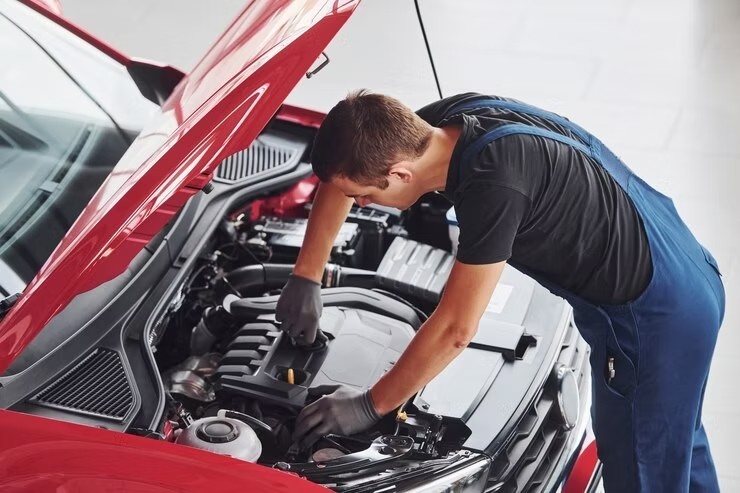Common Car Repair Myths That Could Cost You Money
Nearly 60% of drivers in the U.S. believe at least one car repair myth that ends up costing them money.
If you’ve ever searched for Car Repair in Palmdale, CA, chances are you’ve come across advice that sounds helpful, but isn’t. Misleading tips and outdated beliefs can lead to expensive mistakes. In this blog, we’ll break down common car repair myths that may be hurting your wallet and your vehicle. Knowing the truth can help you drive smarter, save money, and protect your car in the long run.
Myth 1: “I should change oil every 3,000 miles.”
This idea was true decades ago. Today, most cars use synthetic oil. It can last 7,500–10,000 miles. Changing too often wastes money and resources. Check your owner’s manual. Stick to the manufacturer’s guidelines. Then change based on time or mileage.
Why it matters: Oil is your engine’s lifeblood. But overdoing changes just wastes materials, and money.
Myth 2: “Premium gas boosts performance in all cars.”
Some believe using expensive fuel gives more power. That is not true unless your engine requires high-octane fuel (look in the manual). For most everyday cars, regular gas works just fine.
Why it matters: You pay more per gallon. There’s no improvement in speed or mileage. Only use premium fuel if your engine needs it.
Myth 3: “Tire pressure doesn’t change much.”
Lots of people skip checking tire pressure. They think it stays steady. But tire pressure drops about 1 psi for every 10°F swing in temperature. Underinflated tires wear more and use more gas.
Why it matters: Proper inflation gives better grip, smoother ride, and can improve fuel economy. Check tire pressure monthly and before long trips.
Myth 4: “All mechanics charge the same.”
Prices can vary widely. One shop might charge $90 per hour. Another charges $60. Cost also depends on parts brands. Always ask for estimates. Compare labor rates and parts costs.
Why it matters: You may pay too much if you don’t shop around. Get at least two quotes on major repairs. Ask about warranties too.
Myth 5: “My car doesn’t need a tune‑up.”
Modern cars don’t use traditional spark plugs or carburetors. They are built to run longer without tune‑ups. But they still need filter replacements, fluid checks, and belt inspections.
Why it matters: Skipping basic service can lead to bigger problems later. Routine checkups keep systems running smoothly and catch small issues early.
Myth 6: “Air filter cleaning works as well as replacement.”
Cleaning an air filter sounds good. But filter material traps dust deeply. Cleaning only reaches the surface. A clogged filter restricts airflow and lowers engine efficiency.
Why it matters: A clean filter means better air flow and smoother engine. Replacing the filter is cheap and very effective.
Myth 7: “If the brakes squeak, I just need to step harder.”
Squeaky brakes usually mean worn pads or dirt. Pressing harder won’t fix the problem. It can wear down rotors or lead to failure. Get them checked and replaced when needed.
Why it matters: Ignoring brake noise is risky. It can lead to unsafe driving conditions and costly repairs.
Myth 8: “Car wash every week wastes time.”
Some drivers skip washing their cars. They think rain or highway dust cleans the surface. That’s not true. Dirt mixes with water spots and bugs. This can damage the paint and clear coat.
Why it matters: A clean car helps prevent rust and paint damage. Wash it every 2–3 weeks, and wax it a couple times a year for protection.
Myth 9: “If the check engine light stays off, my car is fine.”
The check engine light only shows major engine or emissions problems. Minor issues like worn spark plugs or low transmission fluid may not trigger it. But they still affect fuel efficiency and engine life.
Why it matters: Regular diagnostics catch small issues before they turn big. Don’t wait for a light to come on. Have a code scan done every few visits.
How to Avoid These Myths
- Check your owner’s manual
This is your guide to oil change intervals, fuel type, fluid specs, and maintenance schedule. - Ask questions at the shop
Request estimates and explanations. A good mechanic will walk you through what’s happening. - Keep a maintenance diary
Jot down oil changes, brake inspections, filter replacements, and tire checks. It helps you track what needs attention. - Learn the basics
Tire pressure, oil level, brake pads—know what to watch for. Then you can spot issues early and fix them affordably.
In Closing: Steering Clear of Car Myths Saves You Time, Money, and Stress
Avoiding myths saves money and stress. It helps your car run better for longer. For residents of Palmdale and nearby areas, finding a mechanic who knows Honda and Acura inside out makes a big difference.
If you want peace of mind, trust Rocco Honda And Acura Specialists. At roccoshonda.com, we offer:
- Complete oil service, fluid checks, and top-tier synthetic oil
- Honest advice on fuel type, tire pressure, and scheduled services
- Full brake inspections, filter replacements, diagnostics, and tune-up services
- Detail car washes, paint-safe care, and waxing to protect your finish
Our team works by the book, following manufacturer guidelines and avoiding over-servicing. We’re well-reviewed for clear quotes, fair pricing, and quality workmanship. When you search for the Best Honda Mechanic Near Me, you’ll find Rocco Honda And Acura Specialists ready to care for your ride. Visit roccoshonda.com to schedule an appointment today.


